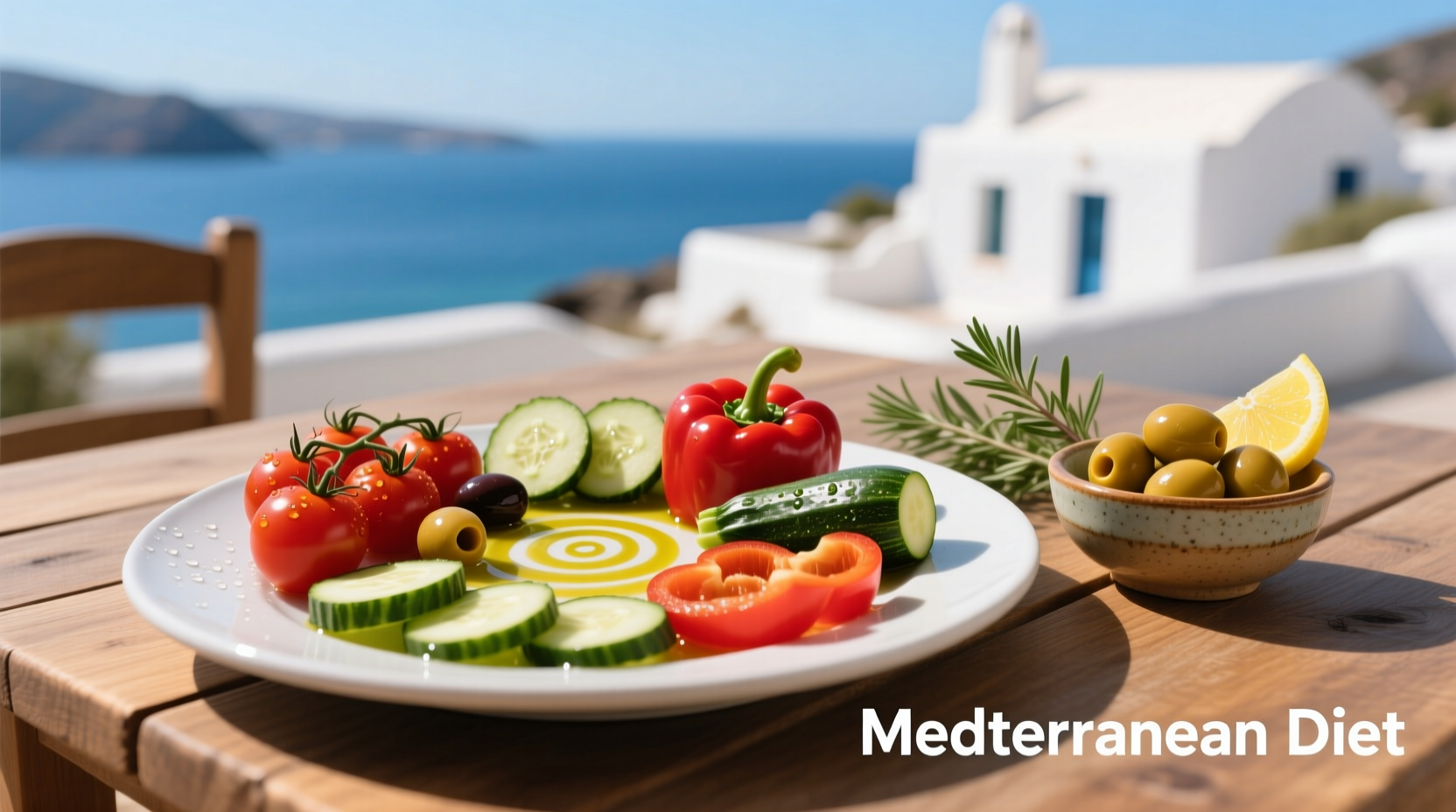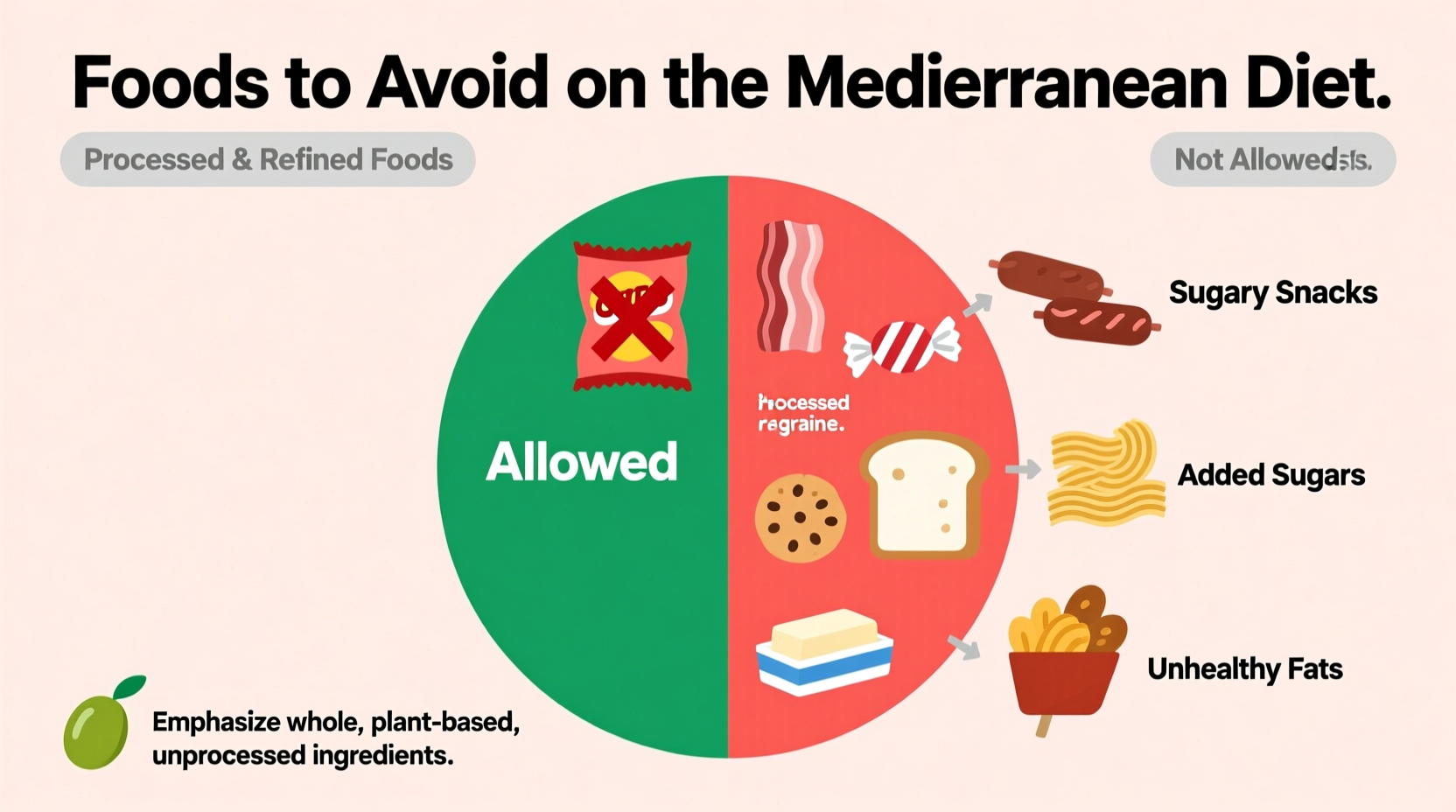The Mediterranean diet restricts processed foods, refined grains, added sugars, and most animal fats. Key foods not allowed include soda and sugary drinks, refined grains like white bread, processed meats, excessive red meat, butter and margarine, and most sweets. This evidence-based eating pattern emphasizes whole, minimally processed foods for optimal health benefits.
Wondering what you can't eat on the Mediterranean diet? You're not alone. As a nutrition approach consistently ranked as one of the world's healthiest eating patterns, the Mediterranean diet has specific guidelines about foods to limit or avoid. Unlike restrictive fad diets, it focuses on what to eat more of rather than strict prohibitions—but certain foods simply don't align with its principles.
Why Certain Foods Don't Belong in the Mediterranean Pattern
The Mediterranean diet isn't about deprivation—it's a celebration of fresh, whole foods rooted in the traditional eating patterns of countries bordering the Mediterranean Sea. This approach naturally excludes highly processed items because they weren't part of the historical Mediterranean food culture. When researchers like those at Harvard's T.H. Chan School of Public Health studied populations in Greece, Italy, and Spain during the 1950s-60s, they found remarkably low rates of heart disease among people consuming diets rich in fruits, vegetables, whole grains, olive oil, and fish.
Modern interpretations maintain this foundation while acknowledging some flexibility. The key isn't about "forbidden" foods but rather establishing healthy eating patterns where certain items become occasional treats rather than staples.
Complete Guide to Foods Not Allowed on Mediterranean Diet
Understanding what foods aren't allowed helps you build authentic Mediterranean meals. Let's break this down by category with practical alternatives:
| Foods Not Allowed | Why They're Restricted | Mediterranean-Friendly Alternatives |
|---|---|---|
| Soda and sugary drinks | High in added sugars with no nutritional value; linked to insulin resistance | Sparkling water with citrus, herbal teas, infused water |
| Refined grains (white bread, white rice, regular pasta) | Stripped of fiber and nutrients during processing; cause blood sugar spikes | Whole grain bread, brown rice, quinoa, farro, whole wheat pasta |
| Processed meats (bacon, sausage, deli meats) | High in sodium, preservatives, and saturated fats; associated with cancer risk | Occasional lean poultry, fish, legumes, eggs |
| Butter and margarine | High in saturated or trans fats; processed alternatives lack health benefits | Extra virgin olive oil, avocado oil, nuts, seeds |
| Most sweets and desserts | High in added sugars and refined carbohydrates; displace nutrient-dense foods | Fresh fruit, small portions of dark chocolate (70%+ cacao), honey-sweetened treats occasionally |
Mediterranean Diet Evolution: From Traditional Practice to Modern Guidelines
Understanding the historical context helps clarify why certain foods aren't included. The Mediterranean diet pattern evolved over centuries:
- 1940s-1950s: Traditional Mediterranean eating patterns documented during post-war era—limited meat, abundant plant foods, olive oil as primary fat
- 1970s: Ancel Keys' Seven Countries Study identifies Mediterranean regions' low heart disease rates
- 1993: Oldways Preservation Trust creates first Mediterranean Diet Pyramid with Harvard and WHO
- 2000s: Scientific consensus grows around cardiovascular and cognitive benefits
- 2010: UNESCO recognizes Mediterranean diet as Intangible Cultural Heritage of Humanity
- Present: Modern adaptations maintain core principles while accommodating diverse lifestyles
This historical perspective shows why highly processed foods never became part of the authentic Mediterranean pattern—they simply weren't available in traditional Mediterranean communities.
Common Misconceptions About Restricted Foods
Many people mistakenly believe certain foods are allowed when they actually contradict Mediterranean principles:
- "All plant-based oils are equal" - While the diet emphasizes healthy fats, it specifically prioritizes extra virgin olive oil over other plant oils like canola or vegetable oil
- "Cheese is freely allowed" - Traditional Mediterranean eating includes modest portions of cheese (primarily feta and halloumi), not daily large servings
- "All seafood is equally beneficial" - While fish is encouraged, fried seafood and breaded preparations don't align with the diet's principles
- "Red wine is required" - Though moderate wine consumption appears in traditional patterns, it's not mandatory and shouldn't be started for health reasons
Practical Implementation: Navigating Real-World Scenarios
Knowing what foods aren't allowed is just the beginning. Here's how to apply this knowledge in everyday situations:
Grocery Shopping Strategy
Stick to the perimeter of the store where fresh produce, fish, and dairy are located. When shopping in aisles, check ingredient lists—if you can't pronounce most ingredients or recognize them as whole foods, they likely don't belong in your Mediterranean pantry.
Dining Out Successfully
When eating at restaurants, avoid anything described as "crispy," "breaded," or "creamy." Instead, look for grilled, roasted, or raw preparations. Request olive oil and vinegar instead of bottled dressings, and ask for whole grain options when available.
Handling Special Occasions
The Mediterranean lifestyle includes celebration and community. When attending events with non-Mediterranean foods, enjoy small portions of special treats without guilt while focusing on the abundance of allowed foods. This balanced approach prevents the diet from feeling restrictive.

Scientific Evidence Behind the Restrictions
These restrictions aren't arbitrary—they're based on decades of research. The PREDIMED study, published in the New England Journal of Medicine, followed 7,447 adults at high cardiovascular risk for nearly five years. Participants following Mediterranean diets supplemented with either extra-virgin olive oil or nuts showed approximately 30% lower risk of major cardiovascular events compared to those on low-fat diets.
Additional research from the American Heart Association confirms that replacing saturated fats (common in butter and red meat) with monounsaturated fats (like olive oil) significantly reduces heart disease risk. Their scientific statement on dietary fats and cardiovascular disease provides clear guidance on which fats to prioritize.
Making Sustainable Changes
Transitioning to the Mediterranean pattern doesn't require perfection. Start by making one substitution per week—replace white rice with quinoa, swap sugary drinks for infused water, or use olive oil instead of butter. Gradual changes become lasting habits. Remember that the Mediterranean diet is a lifestyle, not a short-term diet, so focus on progress rather than perfection.
Final Thoughts on Mediterranean Diet Restrictions
Understanding what foods aren't allowed on the Mediterranean diet provides clarity for building healthy eating patterns. Rather than focusing on restriction, consider this approach as an invitation to explore the vibrant world of whole, minimally processed foods that have sustained Mediterranean communities for generations. The goal isn't elimination but transformation—replacing less healthy options with nutrient-dense alternatives that support long-term wellbeing.











 浙公网安备
33010002000092号
浙公网安备
33010002000092号 浙B2-20120091-4
浙B2-20120091-4